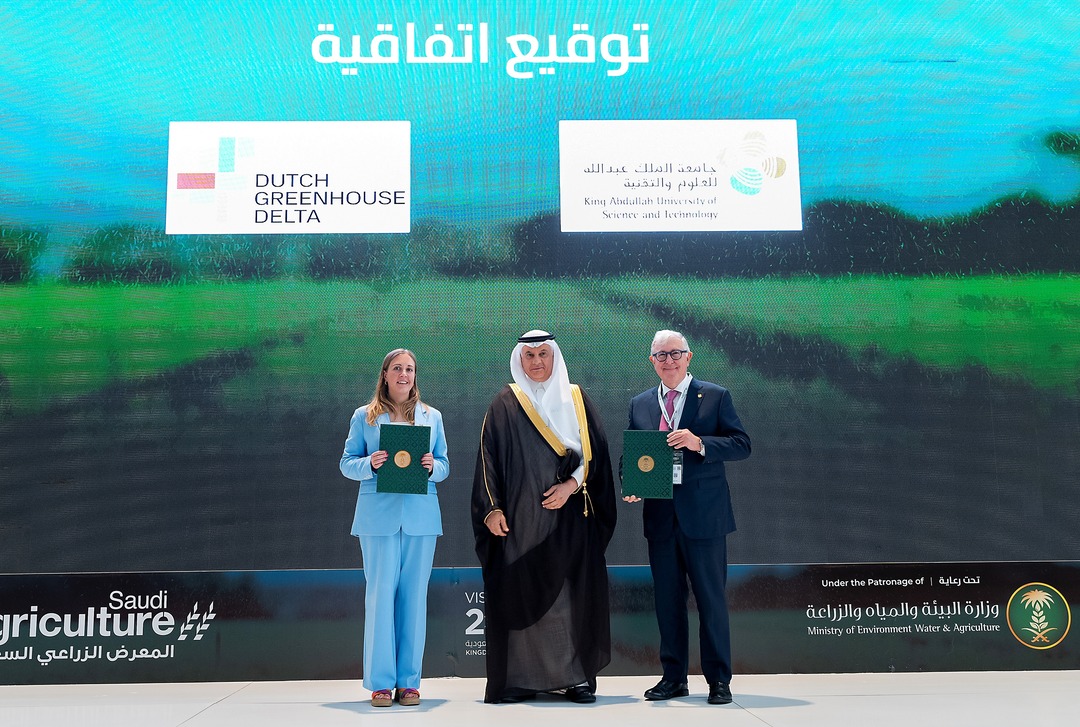KAUST Center of Excellence for Sustainable Food Security unveiled at global agricultural exhibition

Minister of Environment, Water and Agriculture H.E. Eng. Abdulrahman Abdulmohsen AlFadley (center) stands with Dutch Greenhouse Delta CEO Mirjam Boekestijn and KAUST President Sir Edward Byrne AC during the 41st Saudi Agriculture trade show in Riyadh. KAUST and Dutch Greenhouse Delta have signed an MoU to boost food security.
H.E. Eng. Abdulrahman Abdulmohsen AlFadley, Minister of Environment, Water and Agriculture (MEWA), has introduced the KAUST Center of Excellence for Sustainable Food Security to the world during the 41st Saudi Agriculture trade show.
Officially launched by KAUST in September, the Center aims to tackle critical food security challenges in arid regions. KAUST President Sir Edward Byrne AC highlighted that the new Center embodies the collaboration of academia, government and the private sector, united in a shared mission to shape the future of food production and security in the Kingdom.
“Our mission aligns with the broader national strategy to safeguard food security and sustainability in a rapidly changing global environment. The work we begin here today will accelerate impact, improve efficiencies and contribute to lasting solutions.”
Held in Riyadh, October 21-24, this year’s business-to-business exhibition showcased technological innovations and engineering advancements in agriculture, offering a platform for producers, entrepreneurs, industry leaders, decision-makers and suppliers to connect and expand agricultural opportunities within the Kingdom and broader Middle East. The MEWA Minister’s launch of KAUST’s Center of Excellence for Sustainable Food Security was a major highlight at the event.
Chaired by KAUST Professor of Plant Science Mark Tester, the new Center advances technology-based solutions for agriculture, addressing key challenges in resource efficiency, crop improvement and sustainable biosystems to bolster food security in Saudi Arabia and beyond, while also minimizing negative impacts. Tester emphasized the Center’s role in delivering collaborative innovative, technology-based solutions for sustainable food production.
“Let’s together define the challenges, discover the innovations and then deliver the solutions,” he said. “Our Center is here to help deliver impactful research for the Kingdom, supporting Vision 2030 and the RDI priorities.”
The Riyadh exhibition also featured KAUST Professor of Plant Science Salim Al-Babili, who participated in a panel discussion on how agriculture has undergone a monumental transformation due to digital innovations such as artificial intelligence, the Internet of Things, robotics, drones and genomic editing — all areas where KAUST excels.
During the exhibition, three KAUST startups also presented their impactful innovations: Iyris, which is a sustainable AgriClimate Tech company specializing in solutions that enhance crop production in extreme climates; Edama, which delivers state-of-the-art organic waste recycling to the Kingdom; and Terraxy, which provides nature-inspired, cost-effective methods for cultivating plants in harsh desert environments.
Further, KAUST officials participated in a Memorandum of Understanding signing with Dutch Greenhouse Delta to boost food security as outlined in Saudi Vision 2030, aimed at integrating advanced greenhouses with smart water technologies for sustainable fresh food production, climate resilience and best business practices.
The Saudi AgriFood Tech Alliance, a partnership between KAUST, MEWA, the Research, Development and Innovation Authority and Topian, the NEOM Food Company, also attended this year’s exhibition in Riyadh, along with KAUST Beacon Development (the consultancy arm of KAUST). The alliance of around 40 public and private entities unites food and agriculture stakeholders, driving national deployment of technological solutions for the agricultural sector.

